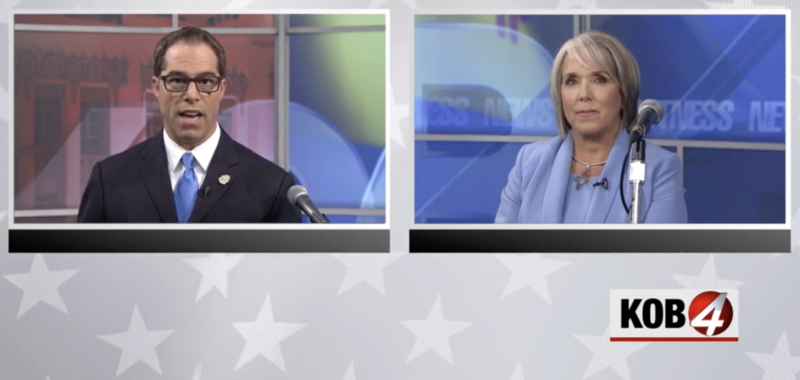NM’s gubernatorial candidates dive into police funding, homelessness, oil and gas, and more

The New Mexico governor went head-to-head with a former meteorologist on Friday in an Albuquerque television studio where they relayed their views and priorities for the state.
Gov. Michelle Lujan Grisham and Mark Ronchetti took priority over NBC’s Friday night primetime TV content to pitch New Mexicans on why one of them should be elected governor in November.
KOB anchor Tessa Mentus and reporter Matt Grubs moderated the first major gubernatorial debate in N.M. of 2022 as voters began requesting absentee ballots to be mailed to their homes.
The pair directed the candidates to share their views on crime, education, state budgets, water and mental health.
When asked about issues related to homelessness, Lujan Grisham shared a message of “tough love” on substance use, saying there should be more ways to make treatment mandatory for someone.
Lujan Grisham also laid out a 2023 legislative goal on this topic: statewide restrictions on panhandling and trespassing targeted toward the unhoused population.
This push to criminalize people without homes formed a bit of agreement between the two candidates. Ronchetti also spoke in support of treatment options, vowing more funding, and stuck the point of vanishing people living in public spaces by saying, “New Mexico cannot be allowed to be someone’s campground, and we’ve seen it.”
In mid-August, Albuquerque city government shut down a longtime camp of people experiencing homelessness that had grown during the pandemic.
City officially shuts down Coronado Park, leaving some to find new place to sleep
Lujan Grisham said the state needs to finish projects to build up to 600 transitional housing units, before reiterating her position that the state must create a better system to address root causes and create more mental health care access.
“Doing it better, doing it faster,” she said, “but I agree, tough love about what’s happening here and not allowing folks to simply reject treatment does have to end in the state of New Mexico,” she said.
Ronchetti affirmed that climate change is real, an inconsistent message since he left TV weather forecasting for GOP politics. His position is the topic of an attack ad in support of Lujan Grisham.
“Climate change is real,” Ronchetti said during a rebuttal. “I’ve said that. I’ve been clear on it. But we can address it without crashing our energy sector.”
The candidates shared similar gratitude for oil and gas money flowing through state programs but divergent ideas on how to spend the revenues that have grown more than $2 billion on state trust land alone in the last decade, according to a September report from the NM Land Office.
New Mexico uses this money to pay for state operations and education. Each candidate said they want to promote extraction activity and leave more money in savings.
Lujan Grisham could point to raises for all state employees as one example of how she spent the additional revenues from the recent oil and gas boom. But it’s unclear when that will happen again.
Ronchetti agreed on more spending in schools and public safety, then split with Lujan Grisham on regulating oil and gas. He disagreed with a position Lujan Grisham shared about concern for climate change, pollution and the effects of the industry.
“We’re going to work with all of the other states and the federal government to make sure that both surface and groundwater gets addressed for the state for the next hundreds of years,” she said.
Ronchetti said he supports state investments in desalination businesses to attract their commerce in New Mexico and partner on water projects, and he reiterated his idea that New Mexicans should get oil and gas royalty checks.
Since it was on a local TV news channel, crime, of course, led the debate.
Lujan Grisham touted her investment of millions into law enforcement, including raises for cops, and said she will be a champion for reform of the pre-trial detention system. “I’m gonna keep fighting until we get that over the finish line,” she said.
During the 2022 legislative session, multiple crime bills to create stricter pre-trial detention guidelines supported by Lujan Grisham failed in committees. Other efforts to increase maximum sentences for certain violent crimes also did not make it far in the Roundhouse.
Dems accuse Ronchetti of disingenuous shift in abortion messaging
Following a national trend, Ronchetti blamed the constitutional change that allows judges to determine whether someone should be incarcerated before a hearing, decreasing the number of people awaiting trial in jail. Bail reform was supported by 87% of New Mexico voters in 2016.
Reform would likely require legislative approval and another constitutional ballot question sent to New Mexico voters.
Speaking of the state constitution, people in N.M. casting ballots this election cycle can vote on Amendment 1, which calls for more money for public education from state reserves — the Land Grant Permanent Fund valued at around $35 billion.
Ronchetti said he opposes the measure. Lujan Grisham supports it and said it could sustain her commitment to fully fund early childhood education.
The candidate’s views on abortion took a chunk of the debate, but ultimately it affirmed their public positions on the topic.
Ronchetti floated his proposal to institute a ban on abortion services after 15 weeks of pregnancy through a constitutional amendment. Lujan Grisham argued against the idea, saying she is the person who can further protect reproductive rights just by being in office.
However she did not share any policy ideas to strengthen the legality of abortion in New Mexico and enshrine it in statute.
Candidates moved through questions well enough that much of the time restrictions — 90 seconds for introduction, 60 seconds to answer questions and 60 seconds rebuttal — set by the moderators went uninterrupted.
New Mexicans tuning into Friday night TV didn’t miss much of the “Law & Order” episode that aired directly after the debate.








